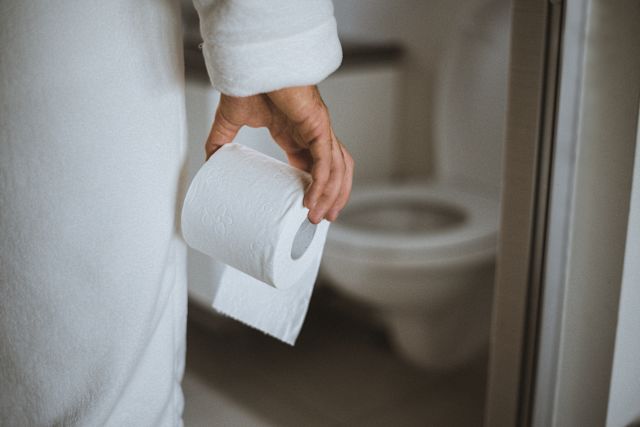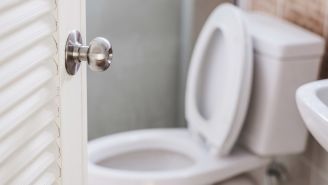Updated on January 23, 2026.
Everyone has problems in the bathroom sometimes. Whether it’s a short-lived bout of diarrhea or a few days of constipation, they’re issues familiar to many of us.
While some restroom issues can indicate bigger health problems, most resolve on their own after a few days. Often, there are steps you can take to speed the process of recovery and even feel better along the way.
What it means to be regular
The digestive system transports and processes food. When you eat, food goes from the mouth, through the stomach (where it begins to be digested) into the small intestine and large intestine. Finally, the remaining waste products travel out of your rectum and anus.
As your meal travels along this path, it's broken down by enzymes, gut bacteria, stomach acid, and bile. Some nutrients are absorbed by the body to use for fuel. The waste that's left over is called stool (or poop). We expel it from the body by having a bowel movement.
Everyone's bowel movements are a bit different. People typically have them anywhere from three times a day to three times a week. Having them more often or less often isn’t uncommon, though it can sometimes signal trouble.
The number of bowel movements doesn’t tell the whole story, however. The energy you exert matters, too.
"You should be passing stool without any problems—it should be an effortless practice," says Joe Llenos, MD, a family practice physician in Homer, Alaska. "If you're starting to struggle passing stool or the amount of stool decreases, it might be a clue to see your doctor."
The texture and color of your stool can also signal that things are moving along well or that you might be having some problems.
- Texture: Healthy stool can be soft, firm, or just about anything in between. It shouldn’t be too far on either side, however. It shouldn’t be very hard or mostly liquid.
- Color: Ideally, your stool is brown or even green on occasion. Black, red, yellow, or greasy stool can mean something is off.
What’s not regular
Short-term bowel movement problems are common. The vast majority of us experience them at some point. Two of the most common are constipation and diarrhea.
Constipation
Constipation is a condition characterized by infrequent and often uncomfortable bowel movements. It can last a few days or for a long time. Symptoms may include:
- You have fewer than three bowel movements in one week.
- Passing stool is uncomfortable or requires a lot of straining.
- You pass stool that’s hard, dry, or lumpy.
- It feels like there’s more left after you have a bowel movement.
Anyone can become constipated. It’s more likely in certain people, such as older adults, pregnant people, and those taking specific medications or who have certain medical conditions. Getting too little fiber in your diet also plays a major role in constipation.
Visit a healthcare provider (HCP) if your constipation happens often or doesn’t get better with treatment. Sometimes, constipation is an emergency. Seek medical help right away if you’re constipated and you vomit, have blood in your stool, or experience severe bloating or pain in your belly.
Diarrhea
Diarrhea is characterized by frequent, loose bowel movements. Among many other things, it can be caused by germs, menstruation, medication, digestive conditions like irritable bowel syndrome, or a food intolerance. Sometimes, it’s just something you ate.
Common symptoms linked to diarrhea include:
- Sudden or intense urges to use the bathroom
- Out-of-control bowel movements
- Cramping or belly pain
- Nausea and vomiting
- Occasional blood or mucus in the stool
- Fever
Anyone can get diarrhea. It often resolves on its own, but sometimes can lead to serious complications. The first is malabsorption, which occurs when your body doesn’t absorb the nutrients it needs from food. The second is dehydration, where your body lacks enough fluid to function properly. Severe dehydration is very dangerous, especially for young children.
See an HCP if diarrhea lasts more than two days. Get medical help right away if diarrhea is accompanied by a fever of 101F or more, or if the stool is black or bloody. Intense pain is a warning sign, too.
How to stay regular
If you find your bowel movements are off, a few tweaks may be all you need to get back on track.
Steps to ease constipation
Llenos recommends drinking more water and eating a diet full of fiber-rich fruits and veggies. "It's very important to drink a lot of water. I tell my patients to drink until their urine is clear," he says.
Overhydrating is a concern for people with certain health conditions, like heart failure and kidney disease. Speak with an HCP about the amount of fluid that’s right for you. As a general rule:
- Men should get 3.7 liters of fluid each day.
- Women should get 2.7 liters of fluid each day.
This includes water and other fluids, as well as the water we get from the foods we eat.
If fiber and water don’t help, talk to an HCP. They may tell you to take a laxative, which is a medicine that helps get your bowels moving. They may also check your medications to see whether they may be playing a role.
Steps to ease diarrhea
In adults who aren't using antibiotics or experiencing bloody stools or fever, it can help to take an over-the-counter medicine to help relieve diarrhea. Two popular options are:
- Loperamide (Immodium)
- Bismuth subsalicylate (Pepto Bismol or Kaopectate)
Never give these medications to children without talking to an HCP first. If your child has diarrhea for longer than 24 hours, call an HCP.
Drinking plenty of water or liquids with electrolytes—such as sports drinks, Pedialyte, or juice— can also help ease symptoms and prevent dehydration when you have diarrhea. Try to limit or avoid greasy or spicy foods, and go easy on high-fiber items, too. Stick instead to low-fiber foods that will go easy on your stomach, like those in the BRAT diet. BRAT stands for:
- Bananas
- Rice
- Applesauce
- Toast
How to stay regular in the future
There’s no way to totally prevent diarrhea or constipation. You can’t get a shot or take medication to avoid them. But you can greatly lower your risk of both by adopting a few key habits. These include the following.
- Get plenty of physical activity. Exercise aids digestive function.
- Drink enough water and other fluids to stay hydrated.
- Make sure you’re getting enough fiber in your diet, preferably from fruit, vegetables, and whole grains like brown rice and oatmeal.
- Eat foods that contain probiotics, which help maintain your gut health. These include yogurt, kefir, miso, sauerkraut, and pickles.
- Wash your hands regularly. This can help prevent illnesses that cause digestive issues.
- Wash, cook, and store food correctly.
If diarrhea or constipation happen regularly, remember to speak to an HCP. They can make sure there isn’t an underlying cause and give you guidance for avoiding it in future.







